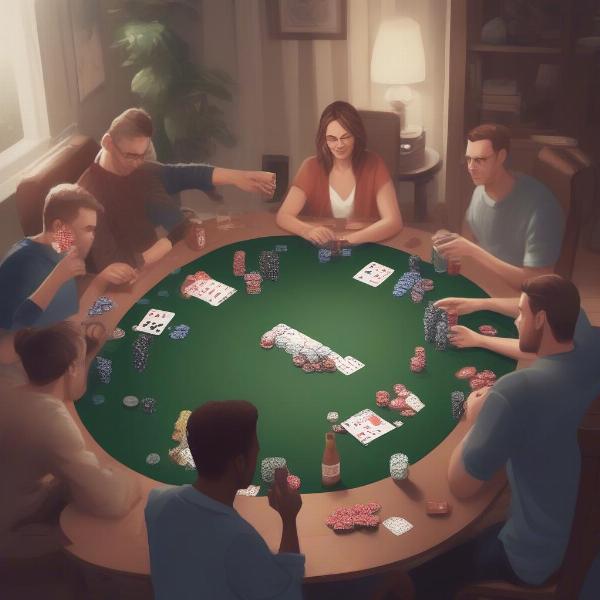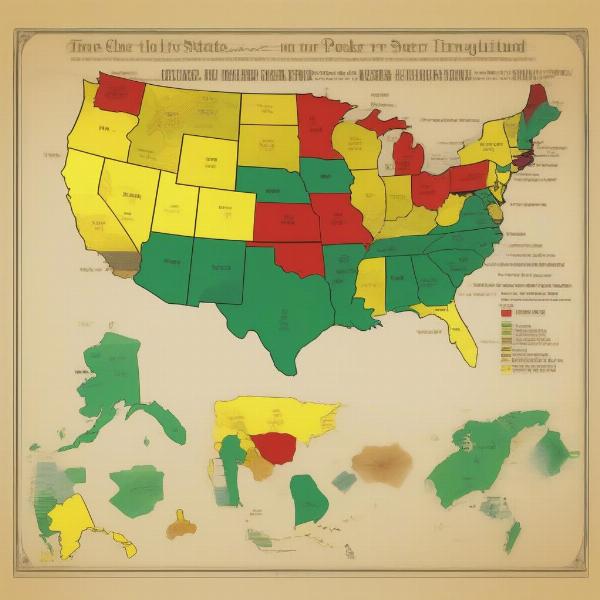Are Home Poker Games Legal? The legality of hosting or participating in a home poker game is a complex issue that varies significantly depending on your location. Understanding the nuances of local laws and regulations is crucial to ensure your friendly game stays on the right side of the law. This comprehensive guide will explore the legal landscape surrounding home poker games, providing you with the information you need to play responsibly and legally.
Understanding the Legal Grey Area of Home Poker
The legality of home poker games often falls into a grey area, primarily because gambling laws are frequently written with commercial establishments in mind. Many jurisdictions have laws prohibiting gambling for profit, which can make it challenging to determine whether a friendly home game qualifies as illegal gambling. The presence of factors like rake, high stakes, or regular games can raise red flags and potentially attract unwanted attention from law enforcement.
Key Factors Determining Legality
Several key factors influence the legality of home poker games. These factors can interact in complex ways, making it essential to research your specific location’s laws:
- Location: Laws vary drastically between countries, states, and even municipalities. Some areas have explicitly legalized home poker, while others have ambiguous or outright prohibitive laws.
- Profit Motive: The presence of a “house” taking a cut (rake) or a clear profit motive by the organizer is often a determining factor in legality. Non-profit games are generally viewed more favorably.
- Stakes: The size of the stakes involved can also play a role. While small-stakes games among friends are rarely an issue, high-stakes games can attract scrutiny.
- Regularity: Hosting regular, organized poker games can make them appear more like commercial gambling operations, potentially leading to legal issues.
- Advertising: Publicly advertising your home poker game, especially for a fee, can increase the risk of legal repercussions.
Navigating the Legal Landscape: Tips for Staying Safe
While the legal landscape can seem daunting, there are several steps you can take to ensure your home game remains legal and enjoyable:
- Research Local Laws: Thoroughly research your local laws regarding gambling and poker. Consult with a legal professional if necessary to ensure you understand the regulations in your area.
- Keep Stakes Reasonable: Maintain reasonable stakes to avoid attracting unwanted attention. Friendly games with low buy-ins are less likely to be considered illegal gambling.
- Avoid Rake: Do not take a cut of the pot (rake) as this can be interpreted as profiting from gambling.
- Limit Regularity: Avoid hosting games too frequently. Occasional gatherings among friends are less likely to be considered illegal gambling operations.
- Keep it Private: Avoid publicly advertising your game. Keep the game limited to a closed group of friends and acquaintances.
 Friends playing poker at home
Friends playing poker at home
State-Specific Regulations: Examples and Considerations
Understanding state-specific regulations is paramount. Here are a few examples of how different states approach home poker:
- States with Explicitly Legal Home Poker: Some states have specifically legalized home poker, provided certain conditions are met. These conditions often involve a lack of profit motive and limitations on stakes.
- States with Ambiguous Laws: Many states have laws that are less clear about the legality of home poker. In these states, it is crucial to exercise caution and avoid any factors that could be interpreted as commercial gambling.
- States with Prohibitive Laws: Some states have laws that explicitly prohibit any form of gambling, including home poker games. In these states, it’s essential to avoid any poker games involving money.
Is Online Poker Legal?
The legality of online poker is another complex issue, often distinct from home game regulations. While some states and countries have regulated online poker markets, others have outright bans. Understanding the specific laws in your jurisdiction is crucial before participating in online poker.
 Map showing online poker legality by state
Map showing online poker legality by state
Social and Ethical Considerations for Home Poker Games
Beyond the legal aspects, it’s important to consider social and ethical factors:
- Responsible Gambling: Ensure all participants are gambling responsibly and within their means. Provide resources for problem gambling if necessary.
- Fair Play: Maintain fair play and ensure all players adhere to the agreed-upon rules.
- Respect for Neighbors: Keep noise levels down and avoid disturbing neighbors, especially during late-night games.
“Understanding the legal and ethical dimensions of home poker is crucial for a positive and safe experience,” says John Smith, a legal expert specializing in gambling law. “By adhering to local regulations and promoting responsible gaming, you can ensure your home game remains enjoyable and within legal boundaries.”
What are the penalties for illegal gambling?
Penalties for illegal gambling vary widely depending on the jurisdiction and the severity of the offense. They can range from fines to imprisonment. It’s essential to consult with a legal professional for specific information in your area.
How can I find information about gambling laws in my area?
The best way to find information about gambling laws in your area is to research your state or local government’s website or consult with a legal professional specializing in gambling law.
Are there any legal alternatives to playing poker for money?
Yes, there are legal alternatives to playing poker for money. You can play for points, prizes, or simply for fun. Many online platforms offer free-play options.
Conclusion
Are home poker games legal? The answer depends on a complex interplay of local laws and specific circumstances. By understanding the key factors determining legality and taking proactive steps to ensure your game remains compliant, you can enjoy the thrill of poker with friends while staying on the right side of the law. Remember to always research your local regulations and prioritize responsible gaming.
FAQ
- What is the most important factor in determining the legality of a home poker game? The presence of a profit motive is often the most critical factor.
- Where can I find information on my local gambling laws? Your state or local government website is the best place to start, or consult a legal professional.
- Can I play online poker legally? The legality of online poker varies by location; check your local regulations.
- What should I do if I suspect illegal gambling is taking place? Contact your local law enforcement authorities.
- How can I ensure responsible gambling in my home game? Set clear limits, provide resources for problem gambling, and encourage breaks.
- Is it legal to play poker with friends for small stakes? Generally, small-stakes games among friends are less likely to be considered illegal, but it’s essential to check local laws.
- What are the potential consequences of illegal gambling? Consequences can range from fines to imprisonment, depending on the jurisdiction and the severity of the offense.

